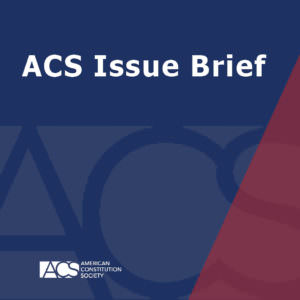Restrictive State and Local Immigration Laws: Solutions in Search of Problems
Professor of Law, Santa Clara University School of Law
Professor and Associate Dean, School of Public Policy, UC Riverside
November 15, 2012
 ACS is pleased to distribute “Restrictive State and Local Immigration Laws: Solutions in Search of Problems,” an Issue Brief by Pratheepan Gulasekaram, Assistant Professor of Law at Santa Clara University, and S. Karthick Ramakrishnan, Associate Professor of Political Science at University of California, Riverside.
ACS is pleased to distribute “Restrictive State and Local Immigration Laws: Solutions in Search of Problems,” an Issue Brief by Pratheepan Gulasekaram, Assistant Professor of Law at Santa Clara University, and S. Karthick Ramakrishnan, Associate Professor of Political Science at University of California, Riverside.
In the Issue Brief, the authors demonstrate that conventional understandings of why states and localities pass restrictive immigration laws do not hold up under empirical analysis. Rather, the data from their nationwide study of 50 states and over 25,000 local jurisdictions show that “what most subfederal jurisdictions with immigration enforcement laws share is not economic stress or overconsumption of public goods or heightened violent crime, but rather a partisan composition within their legislative and executive branches that is highly receptive to enforcement heavy proposals.” These laws are not, as some have contended, organic local responses to inaction at the federal level. Rather, they are the outcome of a concerted and coordinated effort by immigration restrictionists to “purposefully promote legislative gridlock at the federal level, and then cite the very national legislative inaction they helped foment to justify restrictive solutions at the local level.”
Read the full Issue Brief here: Restrictive State and Local Immigration Laws: Solutions in Search of Problems,
